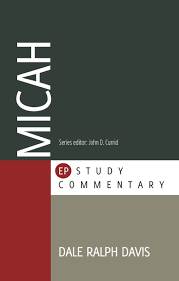
The prophet Micah lived in dark times. He was one of a small remnant of faithful believers living in a godless society where corruption and violence were rife, the vulnerable were the victims of exploitation and the religious leaders failed to speak out against the people’s sin, but instead gave them the message they wanted to hear.
Micah often seemed to be a lone voice as he faithfully proclaimed God’s word, warning of judgement to come on the nation — a judgement from which even the believing remnant would not be exempt. Yet at the same time he also preached a message of hope, pointing his hearers forward to the coming of Christ and to the future glories which await the true people of God, Jews and Gentiles alike. With such a prospect in view, the book closes on a note of triumphant praise to God as the prophet marvels at his grace and faithfulness to his people.
Using his own translation from the Hebrew, Dale Ralph Davis shows how many of the situations Micah addresses are very relevant to the ex¬periences of Christians in various parts of the world in our own day. He presents the prophet, and the faithful remnant to whom he ministered, as an example and encouragement to us all to start living the life of the next age in this present age, and to trust God’s promises, however dark our circumstances may appear, in the assurance that he has a glorious future yet to come for his church.
Micah often seemed to be a lone voice as he faithfully proclaimed God’s word, warning of judgement to come on the nation — a judgement from which even the believing remnant would not be exempt. Yet at the same time he also preached a message of hope, pointing his hearers forward to the coming of Christ and to the future glories which await the true people of God, Jews and Gentiles alike. With such a prospect in view, the book closes on a note of triumphant praise to God as the prophet marvels at his grace and faithfulness to his people.
Using his own translation from the Hebrew, Dale Ralph Davis shows how many of the situations Micah addresses are very relevant to the ex¬periences of Christians in various parts of the world in our own day. He presents the prophet, and the faithful remnant to whom he ministered, as an example and encouragement to us all to start living the life of the next age in this present age, and to trust God’s promises, however dark our circumstances may appear, in the assurance that he has a glorious future yet to come for his church.


